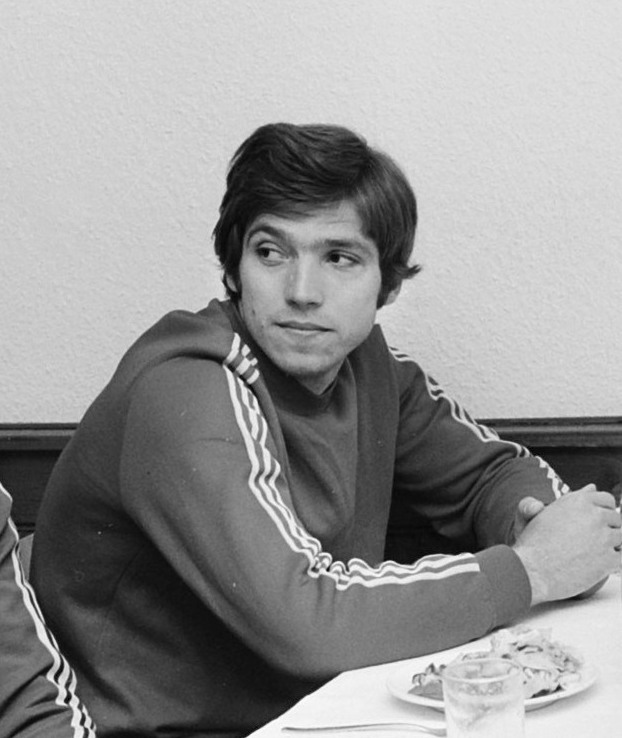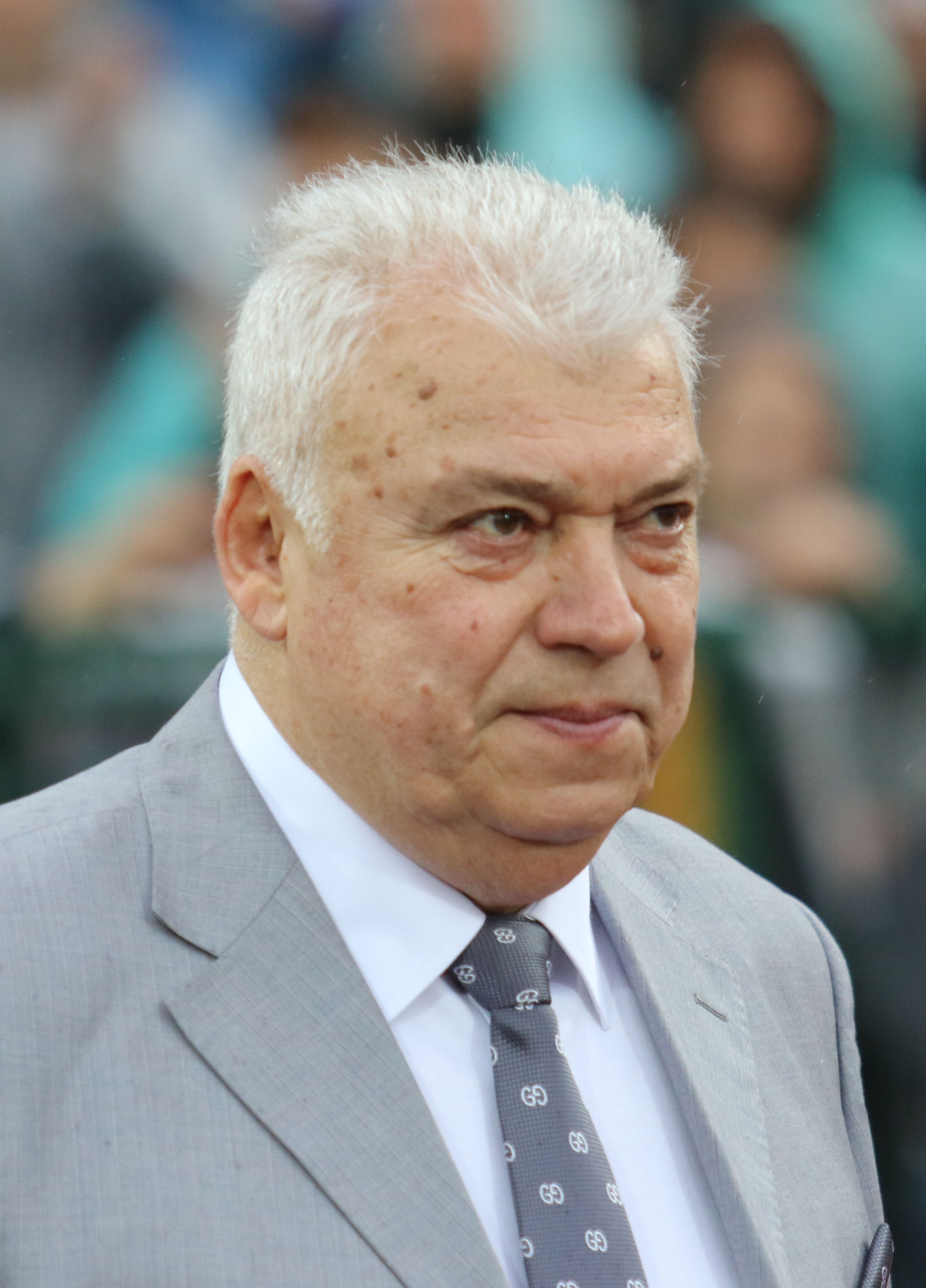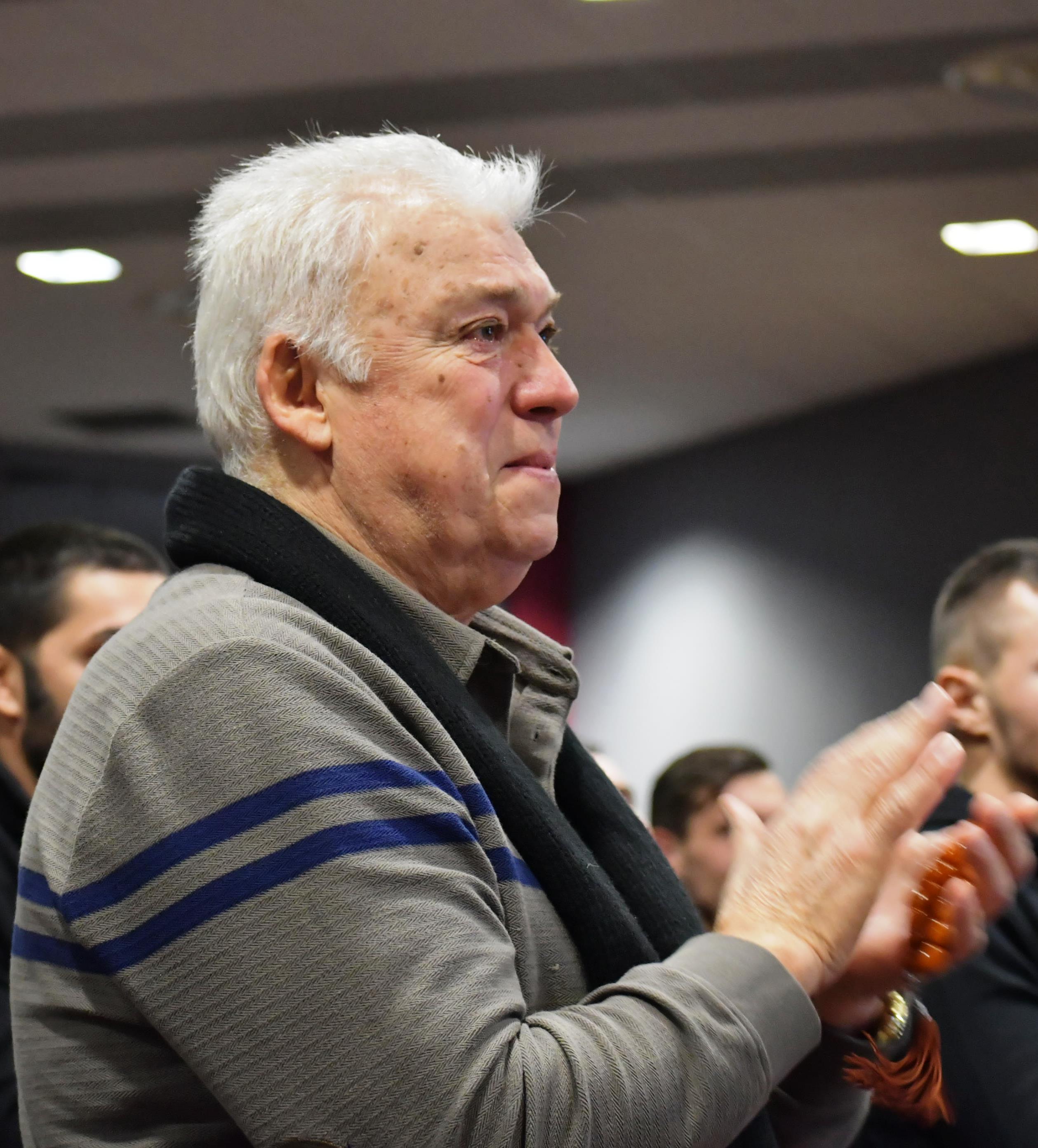1. Early Life and Personal Background
Hristo Bonev was born on February 3, 1947, in Plovdiv, Bulgaria. His early life in Plovdiv laid the foundation for his deep connection with the local football club, Lokomotiv Plovdiv, where he would later become a legendary figure.
2. Player Career
Hristo Bonev's playing career was marked by his prolific goal-scoring ability and midfield artistry, earning him widespread recognition as one of Bulgaria's premier talents.
2.1. Club Career
Bonev's club career began in 1959 at Lokomotiv Plovdiv, where he spent the majority of his playing days across multiple spells. His first period with the club ran from 1959 to 1967, during which he made 64 appearances and scored 19 goals.
In 1967, Bonev had a brief stint with CSKA Sofia, playing 6 games and scoring 5 goals before returning to Lokomotiv Plovdiv in 1968. His second and most significant spell with Lokomotiv Plovdiv lasted until 1979, during which he became the team's undeniable star. During this period, he appeared in 337 matches and scored 161 goals. With Lokomotiv Plovdiv, Bonev achieved notable success, including being the vice-champion of Bulgaria in 1973 and earning two bronze medals in 1969 and 1974.
In 1979, Bonev moved abroad to Greece, joining AEK Athens. His time in Greece was unfortunately hampered by a recurring knee injury, which significantly limited his playing time. He made 10 official appearances over approximately one and a half years before leaving in the summer of 1982. He subsequently attempted a trial with Oxford United in England, making 3 appearances in pre-season friendlies, but his knee injury persisted, preventing a permanent move.
Bonev returned to Lokomotiv Plovdiv for a final spell from 1982 to 1984, making 6 appearances without scoring before officially ending his career in 1984 at the age of 37. Overall, during his time at Lokomotiv Plovdiv, he played in 404 games and scored 180 goals in the A group. He also appeared in 14 UEFA Cup matches for the club, scoring 6 goals. In 1983, he notably won the Cup of the Soviet Army with Lokomotiv Plovdiv.

2.2. International Career
Hristo Bonev was a cornerstone of the Bulgaria national team for over a decade. He made his international debut on March 22, 1967, against West Germany. Between 1967 and 1979, Bonev played 96 times for his country, scoring a record 48 goals, making him Bulgaria's all-time leading scorer.
He represented Bulgaria in two World Cups: the 1970 FIFA World Cup in Mexico and the 1974 FIFA World Cup in West Germany. In the 1970 tournament, he scored a goal against Peru. Four years later, at the 1974 World Cup, he found the net against Uruguay. His final appearance for the national team was on April 25, 1979, against Argentina.

2.2.1. International Goals
Scores and results list Bulgaria's goal tally first, score column indicates score after each Bonev goal.
| No. | Date | Venue | Opponent | Score | Result | Competition |
|---|---|---|---|---|---|---|
| 1 | 9 October 1968 | Mithatpaşa Stadium, Istanbul, Turkey | Turkey | 2-0 | 2-0 | Friendly |
| 2 | 27 October 1968 | Vasil Levski National Stadium, Sofia, Bulgaria | Netherlands | 1-0 | 2-0 | 1970 FIFA World Cup qualification |
| 3 | 15 June 1969 | Vasil Levski National Stadium, Sofia, Bulgaria | Poland | 1-0 | 4-1 | 1970 FIFA World Cup qualification |
| 4 | 22 October 1969 | Stadion Feijenoord, Rotterdam, Netherlands | Netherlands | 1-1 | 1-1 | 1970 FIFA World Cup qualification |
| 5 | 7 December 1969 | Stade Josy Barthel, Luxembourg City, Luxembourg | Luxembourg | 3-1 | 3-1 | 1970 FIFA World Cup qualification |
| 6 | 5 May 1970 | Vasil Levski National Stadium, Sofia, Bulgaria | Soviet Union | 3-2 | 3-3 | Friendly |
| 7 | 2 June 1970 | Estadio León, León, Mexico | Peru | 2-0 | 2-3 | 1970 FIFA World Cup |
| 8 | 9 June 1971 | Ullevaal Stadion, Oslo, Norway | Norway | 1-0 | 4-1 | UEFA Euro 1972 qualification |
| 9 | 4-0 | |||||
| 10 | 7 September 1971 | Grünwalder Stadion, Munich, Germany | West German Amateurs | 1-3 | 1-3 | Friendly |
| 11 | 27 October 1971 | Stadionul Național, Bucharest, Romania | Romania | 1-1 | 1-1 | Unofficial Friendly |
| 12 | 10 November 1971 | Stade Marcel Saupin, Nantes, France | France | 1-0 | 1-2 | UEFA Euro 1972 qualification |
| 13 | 24 November 1971 | Vasil Levski National Stadium, Sofia, Bulgaria | Spain | 7-3 | 8-3 | 1972 Summer Olympics qualification |
| 14 | 24 March 1972 | Stadion Georgi Asparuhov, Sofia, Bulgaria | Soviet Union | 1-1 | 1-1 | Friendly |
| 15 | 16 April 1972 | Stadion Beroe, Stara Zagora, Bulgaria | Poland | 1-1 | 3-1 | 1972 Summer Olympics qualification |
| 16 | 3-1 | |||||
| 17 | 31 May 1972 | Estadio El Plantío, Burgos, Spain | Spain | 1-1 | 3-3 | 1972 Summer Olympics qualification |
| 18 | 21 June 1972 | Stadion Georgi Asparuhov, Sofia, Bulgaria | Italy | 1-0 | 1-0 | Friendly |
| 19 | 18 October 1972 | Stadion Beroe, Stara Zagora, Bulgaria | Northern Ireland | 1-0 | 3-0 | 1974 FIFA World Cup qualification |
| 20 | 3-0 | |||||
| 21 | 19 November 1972 | Tsirio Stadium, Limassol, Cyprus | Cyprus | 3-0 | 4-0 | 1974 FIFA World Cup qualification |
| 22 | 4-0 | |||||
| 23 | 31 January 1973 | Nikos Goumas Stadium, Athens, Greece | Greece | 2-2 | 2-2 | Friendly |
| 24 | 2 May 1973 | Stadion Georgi Asparuhov, Sofia, Bulgaria | Portugal | 2-0 | 2-1 | 1974 FIFA World Cup qualification |
| 25 | 13 October 1973 | Estádio da Luz, Lisbon, Portugal | Portugal | 1-1 | 2-2 | 1974 FIFA World Cup qualification |
| 26 | 2-1 | |||||
| 27 | 6 February 1974 | Morphou Municipal Stadium, Morphou, Cyprus | Cyprus | 2-1 | 4-1 | 1974 FIFA World Cup qualification |
| 28 | 3-1 | |||||
| 29 | 4-1 | |||||
| 30 | 8 February 1974 | Al-Sadaqua Walsalam Stadium, Kuwait City, Kuwait | Kuwait | 2-0 | 3-1 | Friendly |
| 31 | 10 February 1974 | Al-Sadaqua Walsalam Stadium, Kuwait City, Kuwait | Kuwait | 1-1 | 2-1 | Friendly |
| 32 | 2-1 | |||||
| 33 | 31 March 1974 | Z.T.E. Stadion, Zalaegerszeg, Hungary | Hungary | 1-3 | 1-3 | Friendly |
| 34 | 8 May 1974 | Vasil Levski National Stadium, Sofia, Bulgaria | Turkey | 1-0 | 5-1 | 1973-76 Balkan Cup |
| 35 | 2-0 | |||||
| 36 | 25 May 1974 | Vasil Levski National Stadium, Sofia, Bulgaria | North Korea | 1-0 | 6-1 | Friendly |
| 37 | 5-0 | |||||
| 38 | 6-1 | |||||
| 39 | 19 June 1974 | Niedersachsenstadion, Hannover, Germany | Uruguay | 1-0 | 1-1 | 1974 FIFA World Cup |
| 40 | 13 October 1974 | Vasil Levski National Stadium, Sofia, Bulgaria | Greece | 1-0 | 3-2 | UEFA Euro 1976 qualification |
| 41 | 11 June 1975 | Vasil Levski National Stadium, Sofia, Bulgaria | Malta | 4-0 | 5-0 | UEFA Euro 1976 qualification |
| 42 | 25 January 1976 | National Stadium, Tokyo, Japan | Japan | 1-1 | 3-1 | Friendly |
| 43 | 28 January 1976 | Yanmar Stadium Nagai, Osaka, Japan | Japan | 1-0 | 1-1 | Friendly |
| 44 | 5 May 1976 | Vasil Levski National Stadium, Sofia, Bulgaria | North Korea | 1-0 | 3-0 | Friendly |
| 45 | 2-0 | |||||
| 46 | 22 September 1976 | Vasil Levski National Stadium, Sofia, Bulgaria | Turkey | 1-0 | 2-2 | Friendly |
| 47 | 9 October 1976 | Vasil Levski National Stadium, Sofia, Bulgaria | France | 1-2 | 2-2 | 1978 FIFA World Cup qualification |
| 48 | 25 April 1979 | Estadio Monumental Antonio Vespucio Liberti, Buenos Aires, Argentina | Argentina | 1-1 | 1-2 | Friendly |
3. Managerial Career
After concluding his playing career, Hristo Bonev transitioned into football management, first serving as a player-coach for Lokomotiv Plovdiv for a season before his retirement. He then pursued a full-time coaching career, primarily working with clubs in Greece and Cyprus, and later leading the Bulgarian national team.
His first major managerial role was with Panathinaikos in Greece, where he took charge in 1988. He achieved significant success, winning the Greek Championship in 1990 and being recognized as the Manager of the Season in Greece for the 1989-90 season. Following his tenure at Panathinaikos, Bonev managed AEL for three seasons from 1990 to 1993. He then moved to Ionikos in 1993, spending a year there and guiding the club to win the second division league, securing their promotion to the first division.

In 1994, Bonev moved to Cyprus to manage APOEL, staying until 1996. During his time with APOEL, he achieved a domestic double in the 1995-96 season, winning both the Cypriot First Division and the Cypriot Cup. He had also won the Cypriot Cup in his first year, in 1995.
Returning to Bulgaria, Bonev managed Lokomotiv Sofia from 1997 to 1998, an unusual period during which he also took on the head coach role for his home country's national team in 1996. He led the Bulgaria national team to the 1998 FIFA World Cup in France. However, the tournament proved disappointing for Bulgaria, as they only managed to secure one point from three games in the group stage, including a heavy 1-6 defeat to Spain. Despite the outcome, Bonev initially continued as national coach. He eventually resigned from his post in September 1998 after a 0-3 defeat to Poland in the first qualifying match for Euro 2000, stating he believed he had taken the team as far as he could and it was time for a new approach.
After his national team role, Bonev briefly coached Sachsen Leipzig in Germany in 2000. He later returned to his beloved Lokomotiv Plovdiv as manager in 2010.
4. Honours and Achievements
Hristo Bonev's distinguished career as both a player and manager earned him numerous honours, solidifying his status as one of Bulgaria's most decorated football personalities.
4.1. As a Player
- Lokomotiv Plovdiv
- Cup of the Soviet Army: 1983
- Bulgarian Vice-champion: 1973
- Bulgarian Bronze Medal: 1969, 1974
4.2. As a Manager
- Panathinaikos
- Alpha Ethniki: 1989-90
- Ionikos
- Beta Ethniki: 1993-94
- APOEL
- Cypriot First Division: 1995-96
- Cypriot Cup: 1994-95, 1995-96
4.3. Individual Awards
- Bulgarian Footballer of the Year: 1967, 1969, 1971, 1972, 1973 (5 times)
- Best Bulgarian Footballer of 20th century: Third place
- Best Footballer of Plovdiv for 20th century
- Stara Planina Orden - 1st Class
- Honorary citizen of Plovdiv
- Manager of the Year in Greece: 1989-90
5. Legacy and Evaluation
Hristo Bonev is widely regarded as one of the most iconic and influential figures in Bulgarian football history. His reputation stems from his exceptional talent as a player, characterized by his remarkable vision, exquisite technique, and prolific goal-scoring record, particularly as Bulgaria's all-time top international scorer. Beyond the statistics, Bonev was known for his leadership and charisma on the field, which captivated audiences and inspired teammates.
His transition into management further cemented his legacy, as he achieved success in various leagues, demonstrating his tactical acumen and ability to build winning teams. Despite a challenging tenure as the national team coach during the 1998 FIFA World Cup, his dedication to Bulgarian football remained unwavering. His enduring impact is recognized through numerous individual accolades, including being named Bulgarian Footballer of the Year multiple times and receiving honorary citizenship of Plovdiv, his hometown. Bonev's name remains synonymous with footballing excellence and national pride in Bulgaria, where he is celebrated as a true legend of the sport.